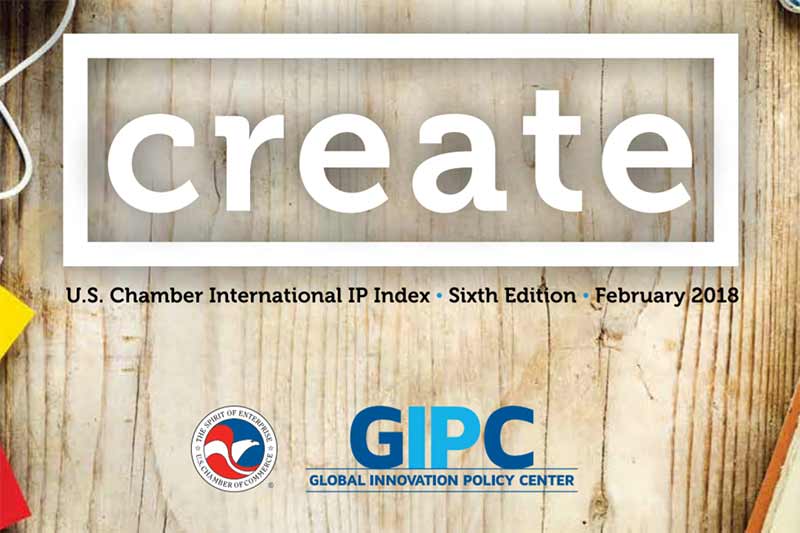
On Feb 8, the US Chamber of Commerce Global Innovation Policy Centre (GIPC) released its 6th annual International Intellectual Property (IP) Index,
“Create”.
Singapore came in at 9th place on global intellectual property (IP) index. Scoring 84%, the city-state is ahead of Switzerland, Australia and New Zealand, and only came second to Japan in Asia-Pacific region.
The global IP index Create analyses IP climate in 50 economies around the world using 40 unique indicators that benchmark activity critical to innovation development surrounding patent, trademark, copyright, and trade secrets protection.
“The results of this year’s Index illustrate a growing global commitment to IP-driven creativity and innovation,” said President and CEO of GIPC David Hirschmann.
“The majority of countries took steps to strengthen their IP systems and foster an environment that encourages and incentivizes creators to bring their ideas to market. While a clear pack of leaders in IP protection top the rankings, the leadership gap has narrowed in a new global race to the top,” he continued.
The US tops the list, followed by Britain, Sweden, France, Germany, Ireland and the Netherlands in the next sixth places. The only two economies from Asia-Pacific region that made it to the top 10 are: Japan ranking 8th and Singapore ranking 9th.
In the last poll, Singapore scored 82% and ranked 8th on the Index in 2016 which assessed 45 countries. Singapore’s improvement on the ranking “reflects a strong performance in the new indicators added”, according to the US Chamber of Commerce.
The latest Index added 6 new indicators in the areas of commercialisation and systemic efficiency to provide a more complete, bottom-to-top picture of the investments countries are making in support of domestic innovation and creativity.
Under the category of systemic efficiency, the 3 new indicators are: (1) inter-governmental coordination of IP rights enforcement efforts, (2) consultation with stakeholders during IP policy formation, and (3) educational campaigns and awareness-raising.
Singapore scored full marks on all three of these indicators.
Singapore’s key strengths identified are: (1) advanced national IP framework in place, and (2) active participation in efforts to accelerate patent prosecutions.
The Intellectual Property Office of Singapore (IPOS) has a number of cooperation agreements and Patent Prosecution Highways (PPHs) in place and is a member of the Global PPH. IPOS also has separate PPH agreements in place with China, Mexico, and the European Patent Office.
While the report recognised Singapore’s key strengths, it also named software piracy and lack of transparency and data on Customs seizures of IP-infringing goods as the country’s weaknesses.
According to the report, estimated software piracy in Singapore has decreased from 35% in 2009 to 30% – but is still quite high for a high-income economy.
In both “availability of frameworks that promote cooperative private action against online sale of counterfeit goods” and “transparency and public reporting by Customs authorities of trade-related IP infringement”, Singapore scored 0.25 out of 1 for each indicator.
The two weaknesses in software piracy and lack of data on Customs seizures were also highlighted in the 2016 survey.
In Asia-Pacific region, the report stated that most of the economies benchmarked in the Index are building more effective foundations for IP policy. Indonesia, Thailand, and Vietnam were named to have long-standing programs to enhance coordination among government agencies responsible for IP enforcement.
Malaysia is also among countries that introduced policies to enable innovators and creators to utilise IP as an economic and commercial asset and encourage legitimate technology transfer. In Malaysia, the government placed an emphasis on encouraging the dissemination of IP as an asset in successive national innovation plans.
However, in some countries, the results were mixed with significant steps forward in some areas and steps back in others.
For example, China adopted proposals to strengthen biopharmaceutical innovation through its patent linkage opinion and expanded regulatory data protection proposal, yet IP-intensive industries continue to face significant market access barriers.
In India, the July 2017 Guidelines on the Examination of Computer-Related Inventions significantly improved the patentability environment for technological innovations. The Government also created IP awareness workshops and technical training programs for enforcement agencies, implementing key deliverables of the National Intellectual Property Rights Policy. However, India’s score continues to suggest that additional, meaningful reforms are needed to complement the Policy.
The Index aspires to provide a blueprint for creating innovative and creative sectors through an effective IP architecture.
“There is still work to be done, and we hope governments will use this Index as a blueprint to further improve their IP ecosystems and grow competitive, knowledge-based economies. When countries invest in strong IP systems, we all benefit,” President and CEO of GIPC David Hirschmann concluded.
















